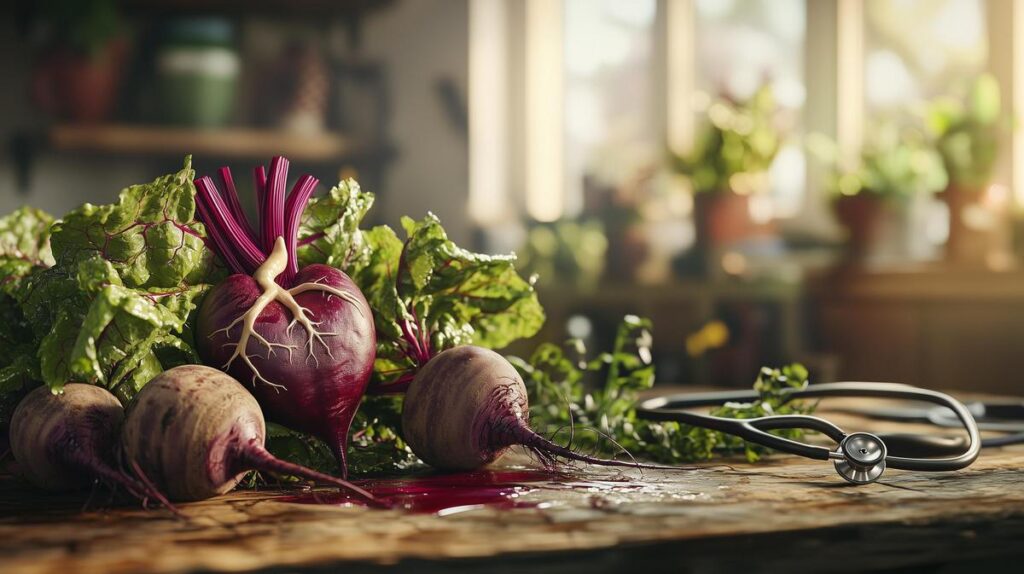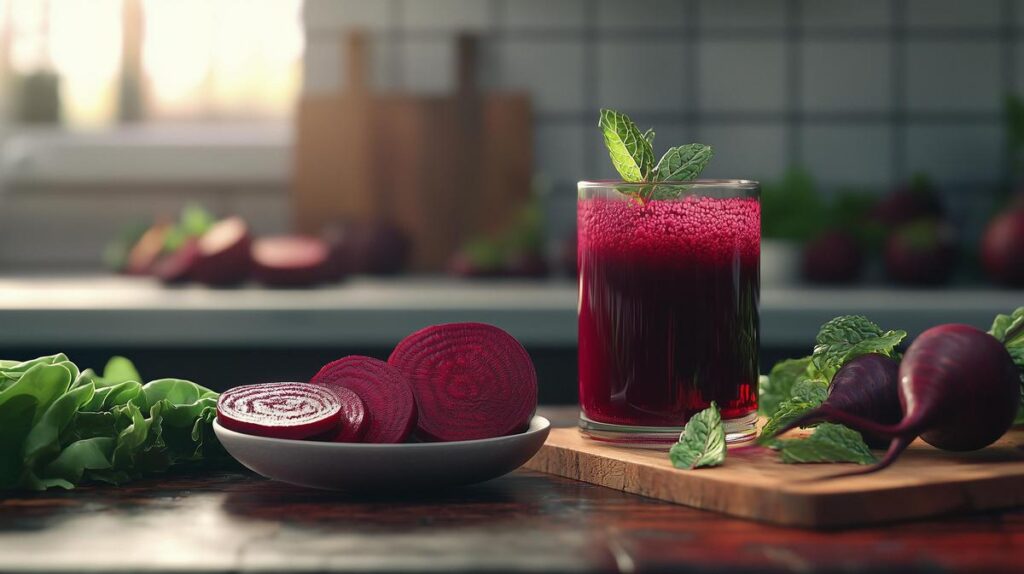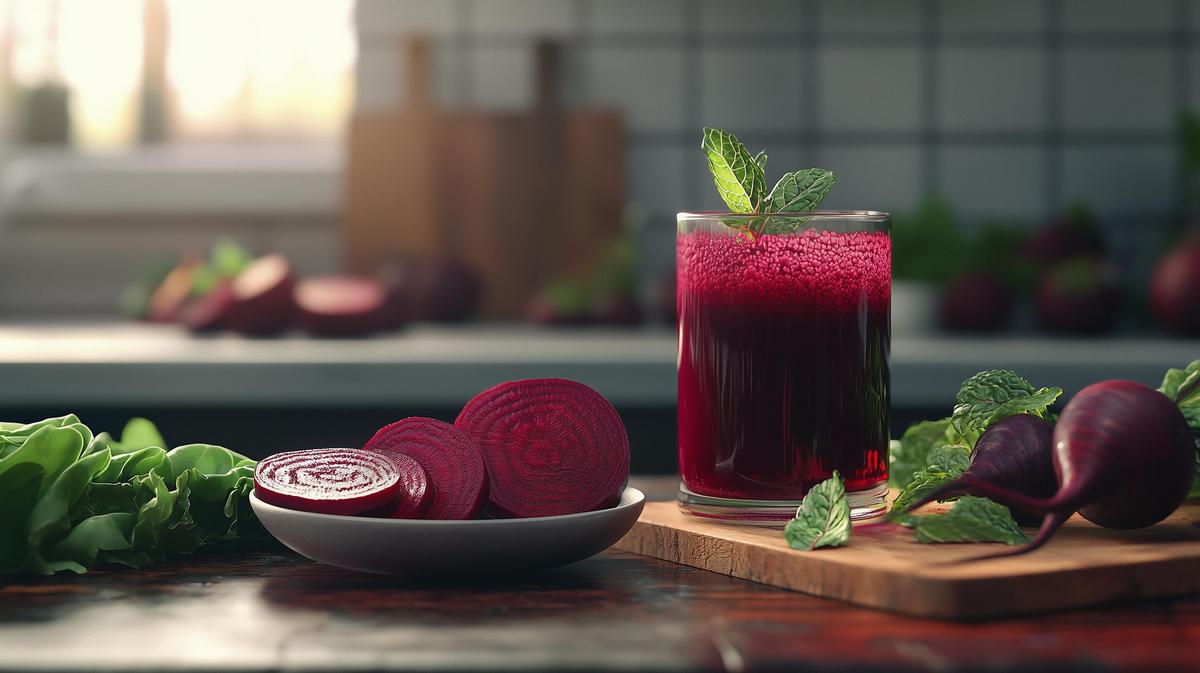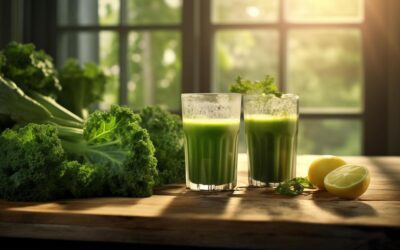TL;DR:
- Nutritional Benefits: Beetroot is low in calories (44 per 3.5 oz.), low in fat (0.2g), and high in fiber (2g), folate (20% of daily needs), manganese, copper, potassium, and iron. Boosts digestion, supports gut health, and aids red blood cell production.
- Heart & Brain Health: High nitrates improve blood circulation, lower blood pressure, support brain function, and reduce risks of heart disease. Folate promotes healthy brain cells. Raw beets retain more nitrates.
- Physical Performance: Nitrates in beetroot enhance stamina, oxygen delivery, and reduce muscle fatigue; betalains aid recovery by reducing inflammation.
- Preparation: Eat raw, roast, juice, or steam; avoid boiling to preserve nutrients. Juice works faster, whole beets retain fiber.
- Risks: Excess can cause kidney stones (high oxalates), beeturia, bloating, or stomach upset. People with low blood pressure should moderate intake.
Beetroot isn’t just a pretty root; it’s a powerhouse for your body. Packed with nutrients that boost energy, improve recovery, and support heart health, it’s a favorite among fitness enthusiasts. But is eating it daily really worth it? From improving stamina to balancing iron levels, beetroot might be the missing piece in your nutrition plan. Let’s dig into the science and discover if this vibrant veggie truly lives up to the hype.
What Are the Nutritional Benefits of Eating Beetroot?
Beetroot is packed with powerful nutrients that make it a top health food. A single 3.5-ounce serving of boiled beetroot contains only 44 calories. It is low in fat, with just 0.2 grams, and provides 2 grams of fiber. This fiber helps keep your digestion healthy and running smoothly. Fiber also supports gut bacteria, which are key for your overall health.
Beetroot is high in folate, giving you about 20% of your daily needs in one serving. Folate supports cell growth and helps prevent certain birth issues. It also has manganese, copper, and potassium, which are vital for strong bones, energy, and nerve health. With these nutrients, beets really pack a punch for your well-being.
If you struggle with low iron levels, beetroot can help boost them. Iron is essential for red blood cell production, and eating beets can make a difference. Combine beetroot with foods rich in Vitamin C, like oranges, to help your body absorb iron better. This is key for keeping your energy levels up and combating anemia.
One lesser-known benefit of beetroot is its ability to lower blood pressure. Beets are full of nitrates, which turn into nitric oxide in your body. This helps relax your blood vessels, leading to improved circulation and a healthier heart. Raw beets are stronger in this effect, but cooked ones still work well.
Beetroot is not just nutritious—it’s also versatile in how you eat it. You can juice it, roast it, steam it, or even eat it raw in salads. Adding a cup of beets to your meals can support your gut, your blood, and your heart. Let beetroot do its job and keep your health in check!
Why Should You Include Beetroot in Your Daily Diet?
Beetroot is packed with health benefits that make it a smart daily choice. First, let’s talk about your body’s defenses. Do you know how beetroot boosts immunity? It’s simple—beetroot is full of antioxidants like betalains. These fight free radicals, which can damage cells and weaken your immune system. Free radicals are unstable molecules your body produces every day. Antioxidants stabilize them, keeping your cells safe and your body healthier. Learn more about antioxidants.
Now think about energy and stamina. Beetroot contains nitrates, which convert to nitric oxide in your body. Nitric oxide makes your blood vessels widen, letting more oxygen reach your muscles. This means you’ll feel more energy when exercising or even just walking up stairs. Studies show beetroot juice can improve stamina by helping muscles work better for longer periods. For best results, consume it a few hours before physical activity—your legs will thank you.
Here’s another reason to eat beetroot daily: it’s an antioxidant-rich superfood. The betalains in beets don’t just support immunity; they reduce inflammation, too. Chronic inflammation can lead to health problems like arthritis or heart disease. Beetroot’s natural pigments help fight this low-grade inflammation before it gets serious. Plus, their deep red color hints at their potent health properties.
Don’t forget, beetroot is affordable and easy to prepare. Whether you roast it, juice it, or toss it into salads, you’re giving your body a powerful, nutrient-packed food. The next time someone asks, “Why eat beetroot daily?” remind them of its immunity-boosting, stamina-enhancing, and inflammation-fighting powers. It’s not just a root—it’s a daily health upgrade.
Can Beetroot Improve Cardiovascular and Brain Health?

Beetroot has a powerful effect on heart and brain health. So, how does it work? First, it’s packed with nitrates that your body converts to nitric oxide. Nitric oxide helps widen blood vessels, which lowers blood pressure and improves blood flow. Studies show this can reduce risks of heart disease and stroke. Eating raw beetroot delivers the most nitrates because cooking breaks down some of them.
Now, does beetroot improve circulation? Yes, it does. Nitric oxide from beetroot relaxes and expands your blood vessels. This means oxygen and nutrients move more easily through your body. Better circulation can even help with physical activity, increasing stamina and reducing fatigue.
But what about the brain? Beetroot’s nitrates also boost blood flow to the brain. This is vital as you age because blood flow drops over time. Research suggests regular beet consumption enhances activity in the brain’s frontal lobe. This area is key for decision-making and memory. Some studies even report faster thinking and better reaction times after drinking beet juice daily.
With its high folate content, beetroot further supports brain health. Folate is essential for producing DNA and maintaining healthy brain cells. A single serving of beetroot provides 20% of your daily folate needs. Insufficient folate has been linked to cognitive decline and memory problems.
For maximum benefit, eat beets fresh or as juice. Pre-packaged beet products might lose nutrients over time. Drinking beet juice or mixing it into smoothies are simple ways to add it to your daily routine. If you want to learn more about folate’s importance, check out this trusted information.
What Are the Best Ways to Consume Beetroot Every Day?
 Raw beetroot has more nitrates than cooked beetroot. This makes it more effective for heart and blood pressure benefits. Cooking, especially boiling, lowers the nitrate levels because heat breaks them down. If you’re looking for the maximum boost in nutrients, eating them raw is better. However, cooking beets can make them sweeter and easier to digest, so it depends on your taste and dietary needs.
Raw beetroot has more nitrates than cooked beetroot. This makes it more effective for heart and blood pressure benefits. Cooking, especially boiling, lowers the nitrate levels because heat breaks them down. If you’re looking for the maximum boost in nutrients, eating them raw is better. However, cooking beets can make them sweeter and easier to digest, so it depends on your taste and dietary needs.
You can add raw beetroot to salads by grating it. It pairs well with carrots, apples, and lemon juice for a tasty crunch. Roasting beets brings out their natural sweetness without losing too many nutrients. My favorite way is to roast them with olive oil and herbs. If you want something creative, try beetroot hummus or soups like borscht. For daily recipes, websites like Natasha’s Kitchen and AllRecipes have plenty of delicious options.
Should you drink beetroot juice or eat the whole beet? Beetroot juice works faster because the body absorbs it quicker. This can help with pre-workout energy and faster blood pressure effects. Juicing removes the fiber, which makes it easier to digest, but fiber is important for gut health. Eating whole beets gives you that fiber and keeps you feeling full. If you’re active, drink juice before exercise, but for fuller meals, add whole beets to your diet.
Switch between juices, raw, and cooked beets to enjoy their benefits in different ways every day. Avoid boiling too much, as it reduces nutrients. Whether you’re blending shakes, roasting veggies, or grating salads, beets can fit into any routine. Try them and see how they benefit your lifestyle.
Are There Any Risks Linked to Daily Beetroot Consumption?
Eating beetroot every day is healthy for most people, but it isn’t risk-free. Can you eat too much beetroot? The answer is yes. While beetroot gives your body loads of nutrients, too much can cause problems. A major concern is beetroot’s oxalate content. Oxalates are natural compounds that may lead to kidney stones in those prone to them. People with a history of kidney stones should limit beetroot intake.
Another side effect could be beeturia. This is when beetroot changes your urine or stool to a red or pink color. It’s harmless, but some find it alarming unless they expect it. Too much beetroot can also lead to bloating or stomach upset due to its high fiber content. Start small and increase your intake gradually to give your digestive system time to adjust.
What about anemia? Beetroot contains iron, making it a great food to support red blood cell production. Eating it can help people with mild anemia, but it is not a replacement for medical-grade iron supplements if you have severe anemia. While beetroot supports preventing anemia, it should not be the only strategy. Pairing it with other iron-rich or folate-rich foods will deliver the most benefits.
Now, can beetroot harm your heart? Beetroot can lower blood pressure because of its natural nitrates. While this is beneficial for most, people with very low blood pressure should monitor their intake. Eating too much could drive their blood pressure even lower.
Balancing beetroot in your diet is key to enjoying its health perks without overdoing it. Rotate it with other vegetables to avoid potential risks from daily excessive intake. More details about beetroot risks and benefits can be found here.
Beetroot works as a strong pre-workout supplement because of its nitrates. Nitrates help your body make nitric oxide, which relaxes blood vessels. This boosts blood flow and oxygen delivery to muscles. If you drink beetroot juice about two hours before exercising, it can improve your stamina. Studies show that it might make some workouts feel easier, letting you push harder.
Athletes can also rely on beetroot for better endurance. During long activities, nitrates improve how your body uses oxygen. This reduces energy loss and helps you perform for more extended periods. Cyclists, for instance, may ride farther or faster with daily beetroot use. Small servings of beetroot juice can increase oxygen use by up to 20%, giving you an edge in demanding activities.
For post-workout recovery, beetroot offers something unique. It contains betalains, which reduce inflammation in your muscles. Hard activities often cause muscle soreness or fatigue, and this is where betalains can help. With less swelling and quicker healing, you might find yourself ready for your next workout sooner. Also, beetroot’s antioxidants guard cells against damage caused by tough exercise sessions.
Adding beetroot doesn’t need to be dull. You can try raw beetroot in smoothies or roasted in meals. Drinking beetroot juice is convenient, but whole beets provide extra fiber. Just remember to focus on moderation; too much can upset your stomach. For more on using natural foods to boost workouts, visit the PURIUM website and use this 50$ giftcard.
Conclusion
Beetroot is a powerhouse food that supports your body in amazing ways. It boosts heart health, brain function, immunity, and stamina while aiding digestion and recovery. Packed with iron, antioxidants, and nitric oxide, beetroot energizes and protects your body. Whether raw, cooked, or juiced, it’s easy to include daily through simple recipes. While beetroot offers incredible benefits, moderation is key to avoid risks like kidney issues. Adding beetroot to your diet isn’t just smart—it’s transformative for your health and fitness. Start now and feel the difference!




 Raw beetroot has more nitrates than cooked beetroot. This makes it more effective for heart and blood pressure benefits. Cooking, especially boiling, lowers the nitrate levels because heat breaks them down. If you’re looking for the maximum boost in nutrients, eating them raw is better. However, cooking beets can make them sweeter and easier to digest, so it depends on your taste and dietary needs.
Raw beetroot has more nitrates than cooked beetroot. This makes it more effective for heart and blood pressure benefits. Cooking, especially boiling, lowers the nitrate levels because heat breaks them down. If you’re looking for the maximum boost in nutrients, eating them raw is better. However, cooking beets can make them sweeter and easier to digest, so it depends on your taste and dietary needs.



